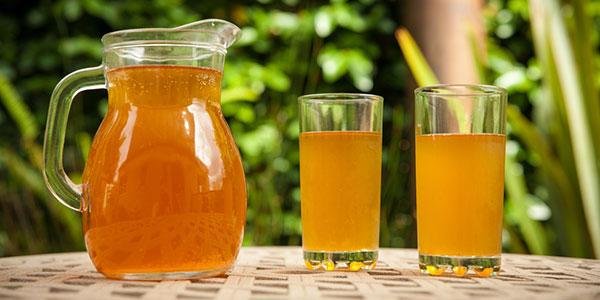
Foodies and savvies of health have more than likely jumped on the "kombucha craze" train.
Individuals flock to kombucha for its declared health benefits. But does this fermented beverage actually live up to its hype? We're finding out!
What is Kombucha?
Kombucha is essentially a sweet tea fermented with yeast and bacteria cultures.
A SCOBY (Symbiotic Culture of Bacteria and Yeast), also known as a "kombucha mushroom", is crucial for differentiating standard black and green teas with kombucha. It also provides most of the associated health benefits along with the distinct taste, often described as vinegary.
Flavor varies between additional ingredients added and the length of fermentation - shorter fermentation offers a sweeter, more mild drink than longer fermented kombucha, which may have a stronger, bolder vinegar taste.
Kombucha Nutrition
A serving of kombucha (8 fluid ounces) generally ranges from 30 to 80 calories, but is also dependent on added flavorings and nutrients - chia seeds, black currant juice, pressed ginger juice, etc. For instance, if chia seeds are added, omega-3 and omega-6 fatty acids are now present along with protein and further nutrients.
However, kombucha without all the frills is simply sugar and acid, offering 20 to 25 percent daily needs of folic acid and several B vitamins. Kombucha is further comprised of probiotics, antioxidants, and trace amounts of alcohol (due to the fermentation process).
Health Benefits of Kombucha
Kombucha-lovers are adamant about all the health benefits the fermented beverage provides - digestive health, immune-boosting, detoxification, weight loss, cancer prevention, and several others.
The benefits are primarily based on personal experiences along with a few studies. Despite the concrete evidence, kombucha's nutritional content can translate to:
Improved Gut Health
The probiotic content is certainly a component to write home about. Pre- and probiotics consistently demonstrate improvements in digestive health - with evidence supporting its use in treating diarrhea and irritable bowel syndrome, fighting against intestinal infections, and preventing and treating yeast and urinary tract infections.
Strengthened Immune System
Probiotics are also shown to strengthen the immune system. Thanks to the "good" or helpful bacteria, probiotics fight against harmful bacteria that enter the body.
Boosted Energy
Though the caffeine content is generally reduced during the fermentation process, the B vitamins it contains are crucial in energy production. B vitamins play an important role in turning foods consumed into energy within the body.
Reduced Chronic Disease
Antioxidants play a valuable role in the prevention of chronic disease. Free radicals (toxic molecules in the body produced from diet, stress, smoke, and other environmental factors) are shown to contribute to heart disease and cancer.
Antioxidants help to combat and destroy free radicals that may damage the body, especially over time.
Weight Loss
Disclaimer: Kombucha is not a magic weight loss pill. Unlike most sodas and soft drinks, kombucha offers nutrients without packing on calories. B vitamins help facilitate energy metabolism and the probiotics can result to improved gut health, keeping bowels regular.
The totality of the identified factors may aid in weight loss or maintenance.
Is Kombucha Safe?
Prescribed safety of kombucha depends on its processing and handling, or lack thereof.
Homemade kombucha grows concern of harmful bacteria contamination and rising alcohol content - especially troublesome for pregnant and lactating women, children, seniors, and individuals with a compromised immune system.
Unless an experienced kombucha maker, most health experts will agree purchasing kombucha from health food stores might be the safest bet.
Commercial products that are refrigerated and pasteurized generally adhere to tighter control of bacterial and alcohol growth, especially over non-sterile conditions and unpasteurized products.
References:
Do I need to include probiotics and prebiotics in my diet? Mayo Clinic.







